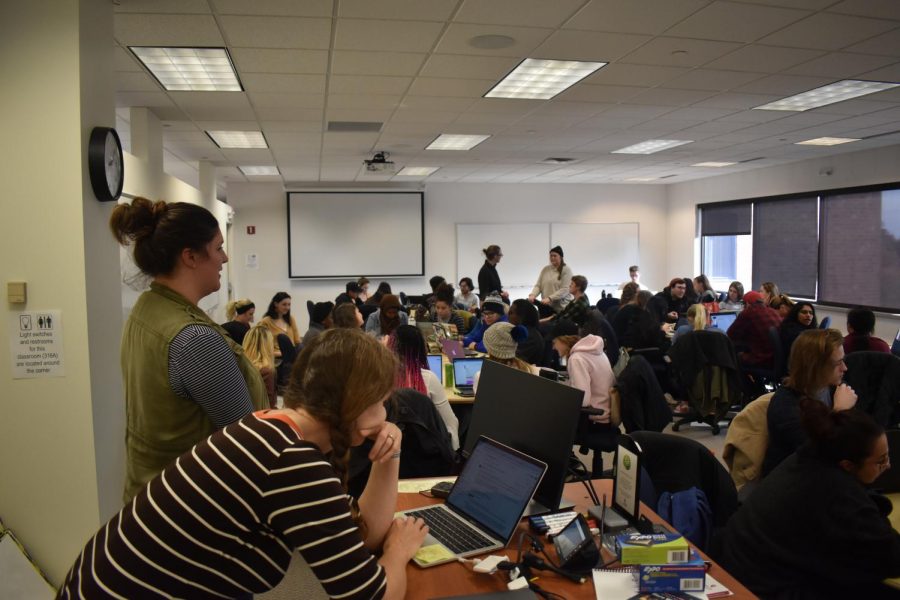Hamline’s first CoLLab class seeks to answer community questions
Four courses from different disciplines merge weekly to collaborate on research goals.
The professors provide assistance but also let student groups in the class take initiative in pursuing their separate projects.
November 6, 2019
For the first time in Hamline’s history, four courses are joining together as one to work toward a common aim.
Every Wednesday afternoon, students from Public Health, Digital Media Arts, Environmental Studies and Professional Writing classes merge to collaborate on interdisciplinary community research projects. Professors Susi Keefe, Curt Lund, Valentine Cadieux and Rachel Tofteland-Trampe respectively work together to teach the class.
The “CoLLab Class,” as the effort is called, is the result of a Dean’s grant for “Collaborative Learning and Community-Engaged Research to Address Environmental Health and Food Insecurity.”
Professors Susi Keefe and Valentine Cadieux had previously taught classes within their own departments where students conducted qualitative research in collaboration with community partners and wanted to create a similar project involving Digital Media Arts and Professional Writing students as well.
“The way we’ve done this in the past is that it’s one class partnering with one community partner, and collaborating around a research topic,” Keefe said. “This semester, we are four classes and we have three community partners.”
Those partners are Hamline student org Feed Your Brain (FYB), Hamline Elementary and the Urban Farm and Garden Alliance’s GrowRx Project. CoLLab students seek to answer research questions related to these organizations’ success, partly through the coordination of focus groups.
Students working with FYB conducted focus groups with students from demographics most likely to be food-insecure, in order to illuminate possible causes of food insecurity. Others spoke to Hamline Elementary parents in order to understand how the school’s Family Resource Room, which provides necessities to students and families in need, could better meet its goals. Yet another group met with GrowRx participants, whose physical and mental health have improved after the program’s gardening regimen, in order to understand the rationale behind the benefits of gardening and learn how the program could improve. Focus group participants received grant money as an incentive.
“I grew up very poor and know what it feels like to not have access to proper food,” said senior Ruweida Sheikh-Mohamed, who is in the Professional Writing course and the GrowRx group. “It’s lovely to know that this is an issue that is being looked at and given care [by the CoLLab class].”
After qualitative data collection from the focus groups and community engagement activities is complete, CoLLab students will analyze it and create deliverables for and with their community partners in interdisciplinary teams.
Junior Ella Smith, a Digital Media Arts student in the Hamline Elementary group, felt that her field of study had not yet been sufficiently incorporated into the class.
“I feel like [the data collection is] mostly for the benefit of the [Public Health and Environmental Studies] senior seminars in the class,” Smith said. “The Professional Writing and the Digital Media Arts classes kind of get pushed to the side… we haven’t had anything, really, that we had to do graphic design for yet [in the Hamline Elementary group].”
Students did not know when they registered for their respective courses that they would be part of the CoLLab class. Keefe said that more CoLLab classes would hopefully be offered in the future, but there are no concrete plans yet.
“We’d actually been working on [this CoLLab class] for more than a year,” Digital Media Arts professor Curt Lund said. “A lot of the choices along the way were student-led.”


